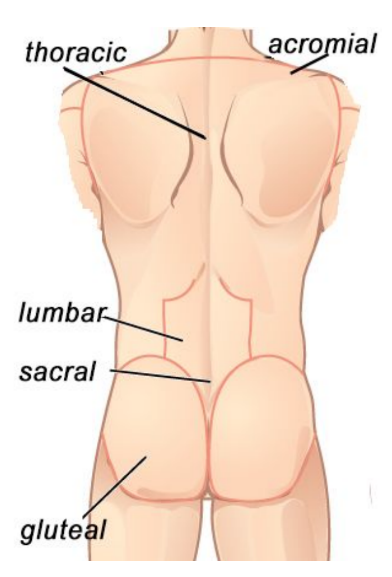Label the Body Regions
( \newcommand{\kernel}{\mathrm{null}\,}\)
Head Region
- The cranial region or cephalic region is the head and skull
- The forehead is referred to as the frontal region.
- The eyes are referred to as the orbital or ocular region.
- The cheeks are referred to as the buccal region.
- The ears are referred to as the auricle or otic region.
- The nose is referred to as the nasal region.
- The mouth is referred to as the oral region.
- The chin is referred to as the mental region.
- The neck is referred to as the cervical region.

The trunk of the body contains, from superior to inferior,
- the thoracic region encompassing the chest
- the mammary region encompassing each breast
- the pectoral region encompassing the muscles of the chest
- the sternal region encompassing the sternum
- the abdominal region encompassing the stomach area
- the umbilicus, or navel,icenter of the abdomen
- the coxal region encompassing the hip area
- the pubic region encompassing the area above the genitals.
The pelvis and legs contain, from superior to inferior,
- the inguinal is the groin region between legs and genitals
- the pubic region surrounding the genitals,
- the femoral region encompassing the thighs,
- the patellar region encompassing the knee,
- the crural region encompassing the shin area of the leg,
- the tarsal region encompassing the ankle,
- the pedal region encompassing the foot
- the digital/phalangeal region encompassing the toes.
- The great toe is referred to as the hallux.
The regions of the upper limbs, from superior to inferior, are
- the axillary region encompassing the armpit,
- the brachial region encompassing the upper arm,
- the antecubital region encompassing the front of the elbow,
- the antebrachial region encompassing the forearm,
- the carpal region encompassing the wrist,
- the palmar region encompassing the palm,
- the digital/phalangeal region encompassing the fingers.
- The thumb is referred to as the pollex.
The posterior view contains, from superior to inferior,
- the dorsal region refers to the entire backside
- the acromial region where the shoulders bones are found
- the thoracic region is the upper part of the back (also chest)
- the lumbar region encompassing the lower back.
- the sacral region occurring at the end of the spine, directly above the buttocks.
The posterior regions of the legs, from superior to inferior, include
- the gluteal region encompassing the buttocks,
- the femoral region encompassing the thigh,
- the popliteal region encompassing the back of the knee,
- the plantar region encompassing the sole of the foot.



